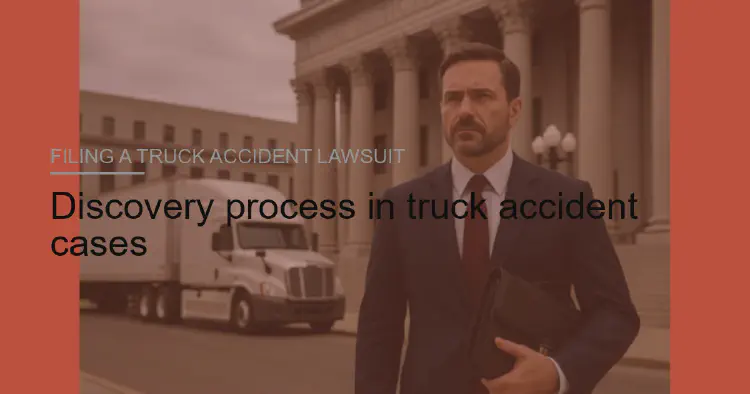Discovery process in truck accident cases
The discovery process is the phase of litigation where both sides exchange evidence and gather information. In truck accident cases, discovery is often extensive due to the number of parties, regulations, and technical evidence involved.
- Truck Accident Law Team
- 2 min read
Article 6 of 6 in Filing a Truck Accident Lawsuit/

Discovery Process in Truck Accident Cases
Purpose of Discovery
- Ensure transparency by requiring both parties to share evidence.
- Prevent trial by surprise.
- Narrow issues for trial and encourage settlements.
Common Discovery Tools
-
Interrogatories
- Written questions requiring sworn answers from the opposing party.
- Example: Asking the trucking company about driver training policies.
-
Requests for Production of Documents
- Demands for specific records such as:
- Electronic Logging Device (ELD) data.
- Black box/ECM downloads.
- Maintenance and inspection logs.
- Employment and training records.
- Insurance policies.
- Demands for specific records such as:
-
Depositions
- Oral testimony under oath from witnesses, drivers, company officials, or experts.
- Transcribed and usable at trial.
-
Requests for Admissions
- Statements the opposing party must admit or deny.
- Helps narrow uncontested facts.
-
Independent Medical Examinations (IMEs)
- Defense may request injured plaintiffs undergo medical exams by their chosen doctors.
Importance in Truck Accident Cases
- Trucking litigation involves complex layers of evidence, including federal regulation compliance, mechanical records, and corporate policies.
- Discovery helps reveal systemic issues such as driver fatigue, falsified logs, or negligent maintenance.
Challenges
- Trucking companies may resist disclosure or delay providing records.
- Attorneys often need court orders (motions to compel) to obtain critical evidence.
- Preservation of evidence (spoliation) is a common battle, especially for black box data.
Strategic Role
- Discovery often leads to settlement negotiations, as evidence strength becomes clear.
- Expert witness involvement begins during discovery, preparing opinions for trial.
Summary: The discovery process is one of the most critical stages in truck accident litigation. By exchanging records, depositions, and expert opinions, both sides uncover the facts needed to prove negligence and determine liability.
You might also like:
- Tags:
- Trucking Companies
- Black Box
- Trucking Company
- Box Data
- Accident Litigation
- Trucking Litigation
- Driver Fatigue
- Electronic Logging
- Expert Witness
- Eld Data
- Settlement Negotiations
- Inspection Logs
- Maintenance Inspection
- Importance Truck
- Cases Purpose
- Critical Evidence
- Insurance Policies
- Negligent Maintenance
- Evidence Preservation
- Opposing Party
- Device Eld
- Logging Device
- Cases Trucking
- Company Officials
- Drivers Company
- Black Box Data
- Truck Accident Litigation
- Importance Truck Accident
- Electronic Logging Device
- Logging Device Eld
- Maintenance Inspection Logs
- Accident Cases Trucking
- Data Black Box
- Drivers Company Officials
- Trucking Company Driver
- Device Eld Data
- Eld Data Black
- Employment Training Records